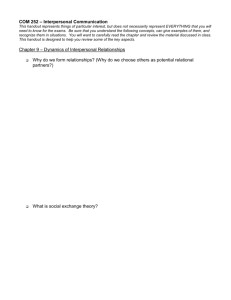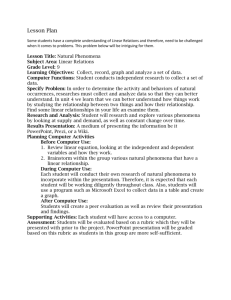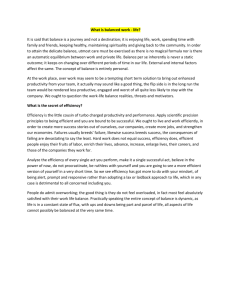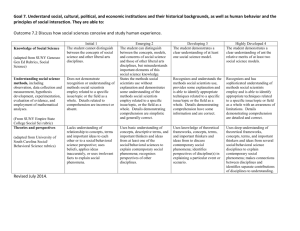Fundamental research questions
advertisement
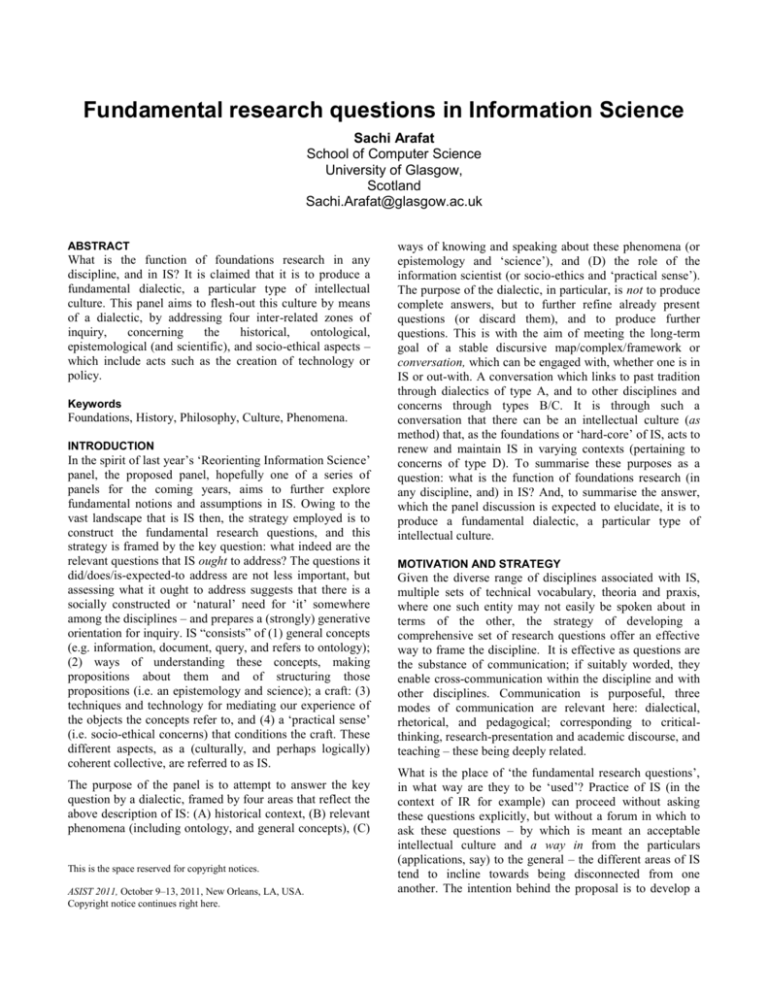
Fundamental research questions in Information Science Sachi Arafat School of Computer Science University of Glasgow, Scotland Sachi.Arafat@glasgow.ac.uk ABSTRACT What is the function of foundations research in any discipline, and in IS? It is claimed that it is to produce a fundamental dialectic, a particular type of intellectual culture. This panel aims to flesh-out this culture by means of a dialectic, by addressing four inter-related zones of inquiry, concerning the historical, ontological, epistemological (and scientific), and socio-ethical aspects – which include acts such as the creation of technology or policy. Keywords Foundations, History, Philosophy, Culture, Phenomena. INTRODUCTION In the spirit of last year’s ‘Reorienting Information Science’ panel, the proposed panel, hopefully one of a series of panels for the coming years, aims to further explore fundamental notions and assumptions in IS. Owing to the vast landscape that is IS then, the strategy employed is to construct the fundamental research questions, and this strategy is framed by the key question: what indeed are the relevant questions that IS ought to address? The questions it did/does/is-expected-to address are not less important, but assessing what it ought to address suggests that there is a socially constructed or ‘natural’ need for ‘it’ somewhere among the disciplines – and prepares a (strongly) generative orientation for inquiry. IS “consists” of (1) general concepts (e.g. information, document, query, and refers to ontology); (2) ways of understanding these concepts, making propositions about them and of structuring those propositions (i.e. an epistemology and science); a craft: (3) techniques and technology for mediating our experience of the objects the concepts refer to, and (4) a ‘practical sense’ (i.e. socio-ethical concerns) that conditions the craft. These different aspects, as a (culturally, and perhaps logically) coherent collective, are referred to as IS. The purpose of the panel is to attempt to answer the key question by a dialectic, framed by four areas that reflect the above description of IS: (A) historical context, (B) relevant phenomena (including ontology, and general concepts), (C) This is the space reserved for copyright notices. ASIST 2011, October 9–13, 2011, New Orleans, LA, USA. Copyright notice continues right here. ways of knowing and speaking about these phenomena (or epistemology and ‘science’), and (D) the role of the information scientist (or socio-ethics and ‘practical sense’). The purpose of the dialectic, in particular, is not to produce complete answers, but to further refine already present questions (or discard them), and to produce further questions. This is with the aim of meeting the long-term goal of a stable discursive map/complex/framework or conversation, which can be engaged with, whether one is in IS or out-with. A conversation which links to past tradition through dialectics of type A, and to other disciplines and concerns through types B/C. It is through such a conversation that there can be an intellectual culture (as method) that, as the foundations or ‘hard-core’ of IS, acts to renew and maintain IS in varying contexts (pertaining to concerns of type D). To summarise these purposes as a question: what is the function of foundations research (in any discipline, and) in IS? And, to summarise the answer, which the panel discussion is expected to elucidate, it is to produce a fundamental dialectic, a particular type of intellectual culture. MOTIVATION AND STRATEGY Given the diverse range of disciplines associated with IS, multiple sets of technical vocabulary, theoria and praxis, where one such entity may not easily be spoken about in terms of the other, the strategy of developing a comprehensive set of research questions offer an effective way to frame the discipline. It is effective as questions are the substance of communication; if suitably worded, they enable cross-communication within the discipline and with other disciplines. Communication is purposeful, three modes of communication are relevant here: dialectical, rhetorical, and pedagogical; corresponding to criticalthinking, research-presentation and academic discourse, and teaching – these being deeply related. What is the place of ‘the fundamental research questions’, in what way are they to be ‘used’? Practice of IS (in the context of IR for example) can proceed without asking these questions explicitly, but without a forum in which to ask these questions – by which is meant an acceptable intellectual culture and a way in from the particulars (applications, say) to the general – the different areas of IS tend to incline towards being disconnected from one another. The intention behind the proposal is to develop a sustainable form of dialectic, so that the debate (as a fundamental dialectic) is something that can be a continuous part of research in IS, and in the collective consciousness of its practitioners. It ought to form a ‘connective glue’ between different aspects of IS and between IS and other disciplines. And for that to happen, there needs be a discursive framework or ‘complex’, at once pedagogical, dialectical and rhetorical. Whether a question ought to be relevant to IS is not given apriori; the four zones of inquiry are generic and can potentially apply to any discipline, and are expected to bring-forth relevant questions. They are points of engagement, points of the discursive ‘complex’. The initial questions in each zone, and the further questions derived from panel discussion, would ideally not only be met with answers from a fundamental-philosophical perspective, but there must also be a path to the particulars: the conditions for intellectual (and ‘scientific’) discourse, technology designs, and ethical concerns. The task for the panelists is then to suggest further questions that range over these aspects. MAJOR LINES OF INQUIRY A. Historical Context Is IS the historical continuation of disciplines such as the memory arts? Does it make sense to go back further than P. Otlet and S. Briet, prior to documentation as such, to traditions that resemble the modern practices that IS thinks it ought to study? Where does information science as a discipline fit into other disciplines, or where ought/can it fit in; or, in light of it having particularly employed the mathematical and natural sciences (e.g. for crafting techniques and devices), and the humanities (e.g. for fleshing out its concepts); is it in a category of its own – is it particularly, peculiarly, and perhaps formally, ‘between’ the natural sciences and humanities? B. Relevant aspects of reality and phenomena therein Are the traditional notions of basic objects and processes: information, retrieval, document, query, interaction, interface, user (subject), institution, `technology/device', etc., still relevant given the ubiquity of devices and modern contexts? Are different aspects of IS using different conceptions thereof? To what extent can we forego addressing these objects rigorously (as socio-cultural objects)? C. Ways of knowing and interpretation, and their particulars. Given the objects and phenomena in B, what type of statements can be made about them, and hence what kind of contribution do/could/ought information scientists make to knowledge? Given the above, does it make sense to formally specify research programmes for IS? What types of facts (about phenomena from B) are ‘interesting’ for IS – and hence, when would an IS research programme become degenerative, i.e. require a replacement? Given that the same IS research project can seek to craft technology (e.g. through IR) as well as make disinterested analysis of social phenomena, does IS require a particular fusion of different (types of) philosophies of science? This would tell us what sorts of `explanation' and mathematical modelling are (supposedly) relevant, and it would bring up further questions pertaining to assumptions made about social objects from a physical point of view as opposed to a social one, for example, in IR. D. Role of Information Scientists as intellectuals, scholars and researchers IS covers grounds that can have immediate public interest (depending on how A-C are conceived). In this respect, it is more than disinterested intellectual activity. It is about making things – e.g. through IR applications, institutional policy, academic practice – that can generate new cultural elements. There are ethical imperatives for that which especially influences the public sphere, but does/ought it affect IS or the role of the information scientist – e.g. are the social ‘dangers’ associated with social networking (in that it may partially cause a detriment in real-life socializing) to be of concern to IS practitioners involved in making software, information policy, etc.? GOALS AND PARTICIPANTS The inquiries are broad and require broad range of experts and expertise, certainly not realizable in one panel sitting, Thus the aim this year, in the spirit of the greater goal of renewing (or maintaining) a sub-culture of dialectic on foundations, is to (1) verify that such a dialectic is indeed necessary and discuss in what way it is so, (2) discuss what the bounding box of inquiry is for IS (i.e. is it A-D?), and (3) to identify a good set of initial questions for a discursive complex that can be built upon. John Budd has written on Phenomenology for IS, relevant for specifically addressing B and C. Ronald E. Day has written on the historical contexts of the notion of information, and on the role of the information scientist, relevant for addressing A and D. Jonathan Furner has written on the history, theory and philosophy of documentation, relevant especially for connecting A and B. Robin Hunt has written on the history and culture of information, relevant for connecting A, B and C. Julian Warner has written on IR from a labor-theoretic perspective, relevant for discussions about B and C in the context of A. MODERATION There will be communication with panelists prior to the panel in order that there is a ‘common sense’ of what is expected as the style of discussion.
